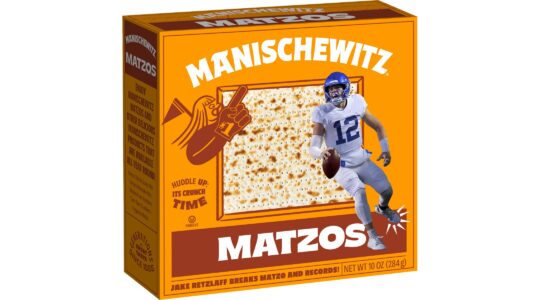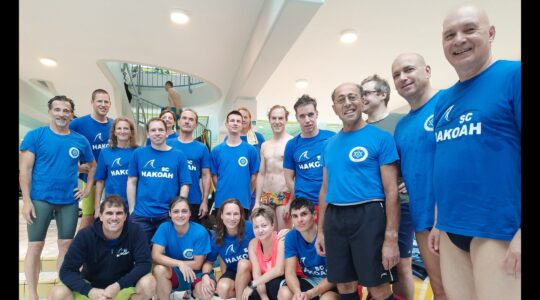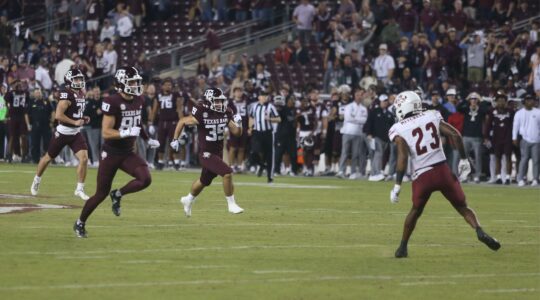
Scouting director Dan Feinstein, left, is part of the Oakland Athletics brain trust at the Major League Baseball draft along with GM Billy Beane, right, the architect of the Moneyball philosophy, June 2014. (Michael Zagaris)
BALTIMORE (JTA) – As director of professional scouting and baseball development for the Oakland Athletics, Dan Feinstein scouts amateur players, evaluates the organization’s talent, is involved in contract negotiations and arbitration cases, ponders trades and analyzes potential free agent signees.
His varied portfolio is news to at least one of the team’s players.
“I don’t doubt that he does a lot, and has done a lot, for the organization, but I don’t know to what extent,” catcher Derek Norris said of Feinstein during a recent A’s visit here.
For the past three years, Feinstein, 42, has been one of the prominent executives powering the Oakland approach to diamond success known as Moneyball under its guru, general manager Billy Beane.
There’s been plenty of success this season for the American League West-leading Athletics, who boast one of the best records in baseball and stand near the top of the league in team pitching and hitting. And they’ve been doing it with an assortment of players excelling in both the traditional and Moneyball statistical categories.
Beane employed the Moneyball strategy to enable his low-revenue Athletics to compete against richer clubs. Popularized by the Michael Lewis book “Moneyball” in 2003 and the 2011 film of the same name starring Brad Pitt, the plan has spread throughout the major leagues.
Moneyball aims to identify and acquire undervalued players by placing a premium on what were then newly minted statistics such as OPS (on-base-plus-slugging percentage), as well as walks, caught stealing, pitches taken and other measures.
Feinstein returned to Oakland in 2011 after spending six seasons as director of baseball operations for the Tampa Bay Rays and a year with the Los Angeles Dodgers. He had spent the better part of a decade splicing game videotapes for the Athletics after starting as an intern in 1994.
Other than his year with the Dodgers, making do on a shoestring budget is the only professional reality Feinstein has experienced. It’s one he embraces.
“We’re always trying to think outside the box and acquire or sign players that maybe have some hickeys to them, and I enjoy trying to find players that are maybe undervalued with other teams,” he said. “It’s really the only way I know.
“While it’d be nice to work with a payroll of some of the other clubs, I very much enjoy the challenge of staying within a constrained budget.”
Moneyball has found success in Oakland, with the Athletics on target to capture their seventh A.L. West title since 2000. They’ve been leading the division most of this season.
Josh Donaldson is second in the league in WAR (wins above replacement) and in the more mainstream category of runs scored. Teammate Coco Crisp is 10th in on-base percentage. No A’s base stealer has been thrown out more than twice.
On the mound, left-hander Scott Kazmir is among league leaders in WHIP (fewest walks and hits allowed per innings pitched), as well as the more traditional statistics of wins and earned run average.
In fact, the A’s lead the A.L. in runs scored and are second in fewest runs allowed – all on a $74.8 million payroll, ranking them 27th in Major League Baseball. In comparison, the Dodgers and New York Yankees are over $200 million.
“Obviously, we’re all thrilled,” Feinstein said of Oakland’s 2014 strength.
Feinstein is ecstatic to be working in baseball.
At 15, he already knew the game was where he wanted to make his career. Feinstein, a catcher who could not make the team at the University of California, Davis, said he “explored every avenue to get my foot in the door” after college.
With the Athletics, who play just down the road from his hometown of Lafayette, Calif., where he still lives, Feinstein started out doing the things interns do — making photocopies and fetching coffee. That’s when he wasn’t lobbying Beane, then the assistant general manager, for additional responsibilities.
In 1995, he jumped at Beane’s offer to add videotaping to his chores. The following season it became his full-time job.
“I’ve been very lucky. I’ve been in the right place at the right time,” Feinstein said. “I don’t think there’s anyone in baseball who would tell you they look at their job as a job.”
Like anyone employed in a baseball team’s front office, Feinstein said, he aspires to “bigger and better things” professionally, including being a general manager. He added, however, “I’m extremely comfortable and thankful in the role I currently have.”
A key aspect of that role is the Major League Baseball draft, which was held last month. Eighteen of Oakland’s 40 selections were pitchers.
“That was by design,” Feinstein explained. “The only way that we’re going to have success at the major-league level is if we have pitching, and you can never have enough of it. It’s the single biggest asset we need to compete.”
Planning for the three-day draft is “a yearlong, exhaustive process that has already started” for 2015, he said.
“It’s one of those things that we all are fascinated with: not only the process, but being in that war room in the week prior to the draft,” Feinstein said.
He’s hopeful the A’s can make a run to the World Series this season – it would be the team’s first appearance in the Fall Classic since 1990.
“There’s a lot of season left to go, and anything can happen,” Feinstein said, “but so far it’s been a perfect storm of a group of guys who’ve come together and played their best.”
JTA has documented Jewish history in real-time for over a century. Keep our journalism strong by joining us in supporting independent, award-winning reporting.





